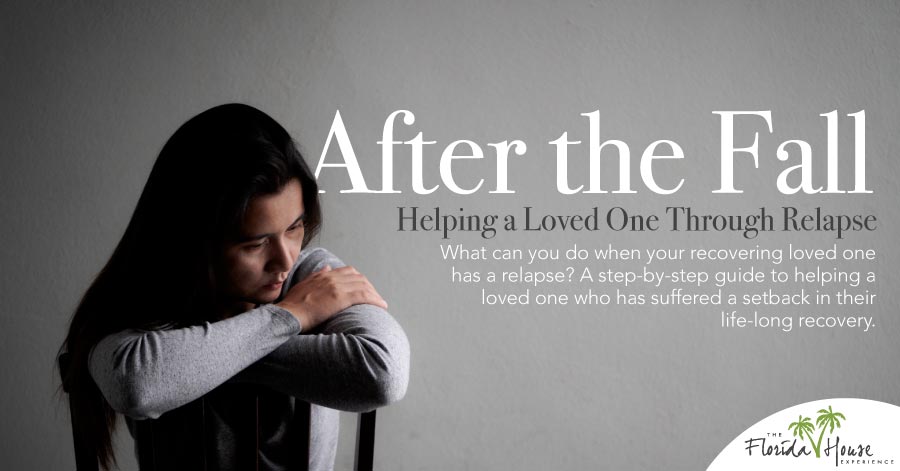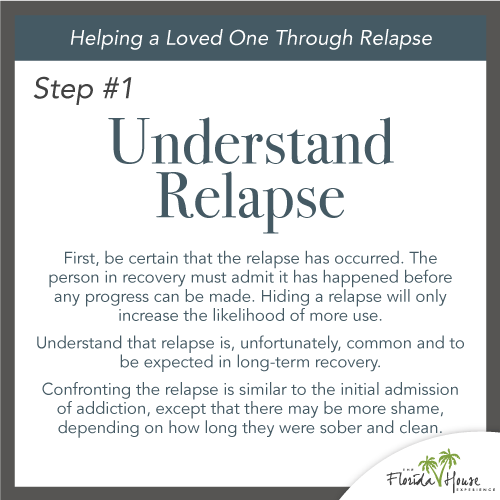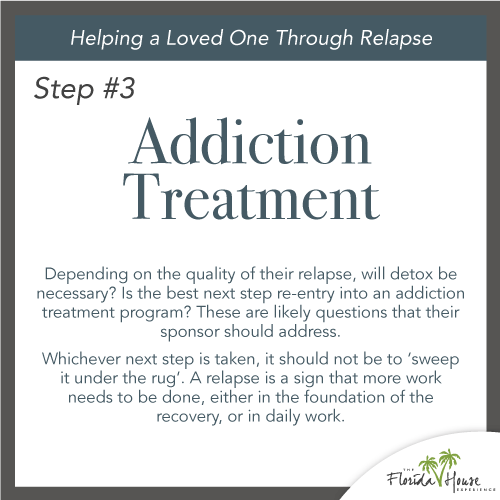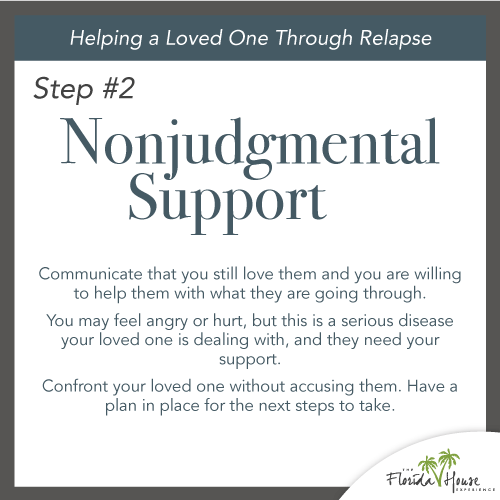
Rehab has helped millions and millions of people across the United States and abroad, and statistically, it’s likely that everyone has someone close to them who is currently in recovery. That makes it important to know what to do if a friend, family member or someone else close to you suffers a setback in their recovery and starts using again.
As with any chronic disease like addiction, relapse isn’t only likely, but in some cases expected. Relapse is far from the end of your loved one’s journey.
Here’s a step-by-step guide to being a helpful resource to your recovering loved one as they work to get their life back on track.
Step 1: Understanding Relapse

Some define a slip is a single event, and a relapse usually consists of a series of slips, sometimes sending a person back to square one in their recovery. In the complete abstinence approach, any slip may be viewed as a complete relapse and mean you are ‘starting over’. This will vary depending on the program and community you are part of. It’s important to remember that whether someone slips up or suffers a relapse doesn’t make them worse than someone who doesn’t. The ‘piling on’ of shame and guilt, while it has its uses in seeking help, may lead to complete regression if not viewed correctly. Furthermore, there’s a reason to believe that relapse rates for addiction are consistent with other chronic diseases.
As reported by the National Institute on Drug Abuse, relapse rates are higher in people receiving treatment for asthma and high blood pressure than they are for addiction. Understanding how your loved one is feeling is the first step to helping them recover from a relapse.
How to Tell if Someone Has Relapsed
After someone undergoes addiction treatment, the struggle to maintain sobriety will likely follow them forever. It’s also probable that you’ve found ways to stand behind them and help them cope with the countless triggers and temptations as they continue in their recovery.
When relapse occurs, it may not jump out at you. Addicts often admit a slip. They may even turn to a group for support and to develop strategies of avoidance in the future. In a relapse, however, the user has committed to the frequent use of their drug of choice once again, so they may hide it.
Shame is a prevalent theme in addiction treatment and recovery. Studies show that being ashamed of one’s actions actually hurts the odds of successful recovery. Despite the treatment community’s best efforts to battle stigma and shame, it’s still an extremely common emotion for addicts.
Recovering addicts may feel shame about things they said or did when they were using or look at their addiction like it’s a moral failing rather than a physical and psychological disease. Even if they count on your support in recovery, shame may motivate them to hide their relapse.
Here are some signs that a loved one has suffered a setback in their recovery:
- They begin to spend less time with those close to them or show signs of hiding their whereabouts or behavior.
- They start to revert to old behaviors or get back in with old social circles.
- Money becomes a bigger issue.
- They become defensive more easily.
This is where it’s important to stay up to date on common physical side effects of using various drugs, even if you’ve never abused drugs or alcohol yourself. For example, if a loved one is a former heroin user, you should understand that some of the side effects of using heroin involve symptoms including visible track marks on the arms and flu-like symptoms and heavy drowsiness.
Step 2: Nonjudgmental Support
The first way to help a loved one who relapses is one that doesn’t take any personal or financial resources: communicating to your loved one that you care, you understand what they’re going through, and you’re there for them unconditionally.
To achieve this, you likely to need to reflect on your role in the person’s recovery. It’s understandable that you might feel hurt or angry that your loved one couldn’t stay sober, but negative feelings from you just serve to make the situation worse. You have to help your loved one move forward, and you can only do this with unconditional support.
Secondly, confront your loved one and inquire about their drug or alcohol abuse without accusing them of anything. You need to communicate that it will be OK, NIDA refers to addiction as a “chronic, relapsing disease.” The Journal of the American Medical Association (JAMA) claims that even those who have undergone the most effective treatment programs relapse about 40 to 60 percent of the time.
Show your loved one that you love and support them and will continue to love and support them no matter what happens. Then you can start to plan where to go next.
Step 3: Addiction Treatment

First, they may feel like starting over is confirmation that they failed. They may worry about judgment from the community and the support systems they developed in the past. They may also feel that they still have the skills they acquired during their last cycle through the continuum of care.
Here’s why formal treatment is the most effective option:
- Any time a person is using drugs or alcohol, it’s effective to undergo medically-assisted detox to wean off. It’s also safer than trying to get clean alone.
- Recovering from a relapse is different from recovering from addiction the first time. Sure, the strategies are fundamentally the same, but the priorities may be different. For example, reflection on past recovery goals is necessary to identify methods of not falling into the same trap and discovering why the relapse occurred in the first place.
As someone close to a recovering addict, it’s your job to help them find effective treatment so they can get back on track with the guidance of addiction medicine specialists who can use best practices to give them an optimal chance to succeed in future attempts at lasting sobriety.
If you have a loved one in need of high-quality addiction treatment, call FHE Health. We can give you information to be a resource for a person close to you in need.







